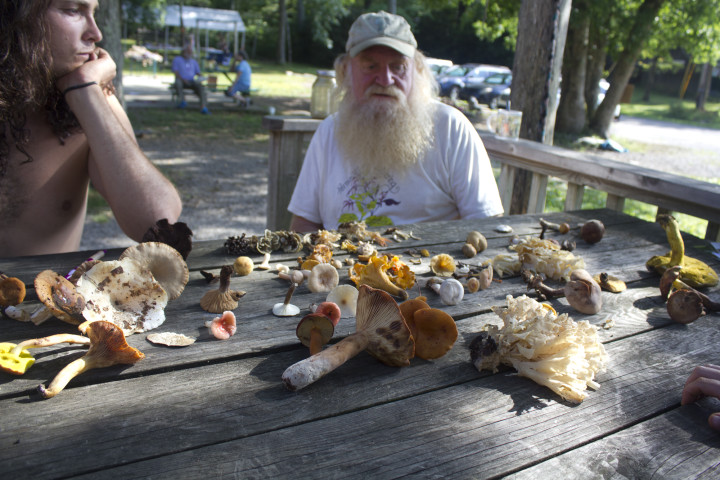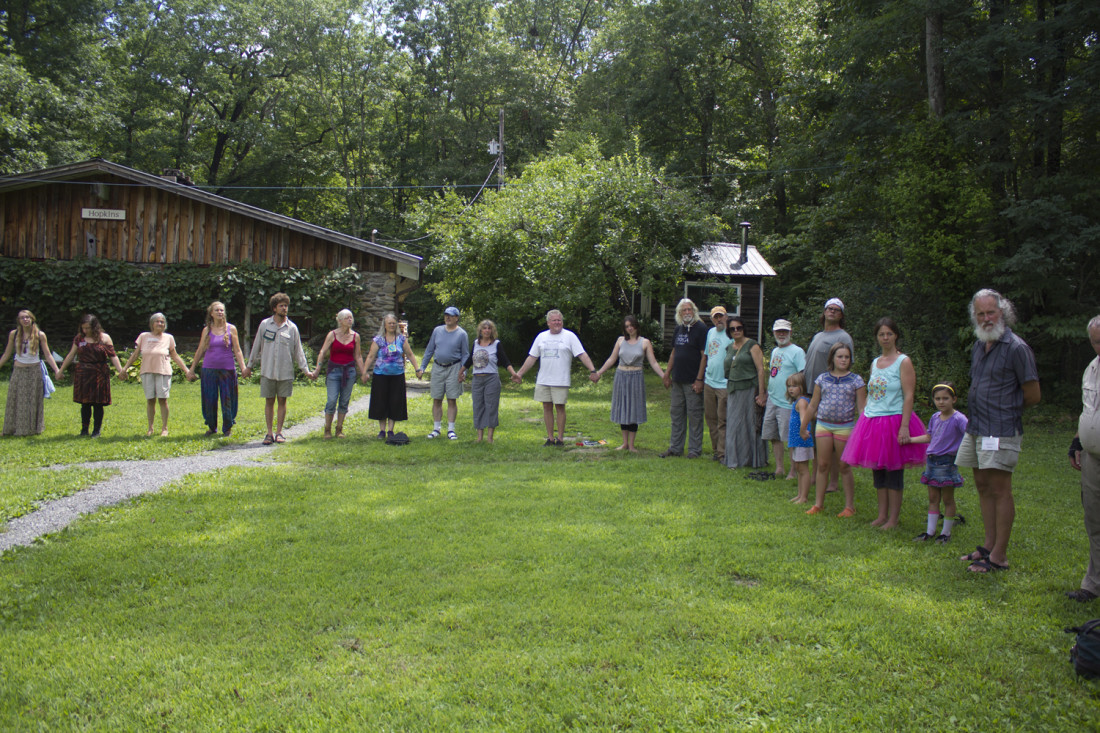The Southeastern Permaculture Gathering has been exploring the ecological, agricultural and social aspects of permaculture practices since its beginning in 1994. On the pastoral grounds of the Arthur Morgan School in Celo, near Burnsville, 125 people gathered Aug. 5-7 to camp, teach, share meals and network with like-minded permaculture enthusiasts. As attendee and permaculture expert Chuck Marsh explains, “This weekend reminds us of who we really are, nourishing our bodies, hearts and souls.”
Family get-together
Permaculture looks to nature for inspiration for its principles and practices. It makes sense, then, that the family unit is one of the forms that permaculture enthusiasts draw on when thinking and talking about their movement. “The Gathering is like a family reunion,” says Gred Gross, who has been part of the event since its founding. Seeing younger people join the group and take on leadership roles, Gross continues, “gives me hope for the future, to see the next generation pursuing sustainability.”
Zev Friedman, 35, of Living Systems Design and the School of Integrated Living, is one of those younger leaders who is taking a place at the head of the family. “I keep returning to this community because these folks are caring, open-minded, fun and action-oriented,” says Friedman, who is a resident of Earthaven Ecovillage near Black Mountain. As part of the larger permaculture movement, he explains, “We’re slowly replanting a life-giving culture from the ancestral seeds that have survived in the soil left from composting the failures of the past.”
About a third of this year’s attendees were experiencing the Gathering for the first time. Although most came from North Carolina, people also traveled from Tennessee, South Carolina, Virginia, Georgia and Florida, and one person came all the way from New Jersey. Several of the younger folk on hand were associated with the Worldwide Workers on Organic Farms program. The workers spend their summers on local farms, trading their labor for room, board and hands-on education. Attending this and similar gatherings often allows young people to connect with farmers and homesteaders, which can lead to employment or other opportunities.
A reason to hope
Marsh points to a number of new books published over the past year, as well as the proliferation of permaculture courses around the world, as evidence that permaculture is on the rise. He and Friedman say they believe people are drawn to the hopefulness of the philosophy. “We do have the power to provide for much of our own food and to meet our needs through interdependence and cooperation,” Marsh explains.
According to Friedman, the permaculture philosophy is based on three key principles: care for the earth, care for people and returning surplus production back to the ecosystem. Acting in accordance with these principles, Friedman says, allows humans to function as beneficial participants in living systems rather than “just trying to reduce the harm we cause.”
A unique feature of the Gathering is its planning and decision-making process. Rather than attend prearranged classes, participants of the Gathering come together for an “Open Space” planning session. All are invited to propose conversations around topics they are passionate about, to share what they know and to learn. The Open Space model encourages people to “vote with their feet,” that is, to choose offerings that resonate with them. Playful mottos promote a natural, nonhierarchical learning experience: Whoever comes are the right people. Whatever happens is the only thing that could have happened. When it’s over, it’s over.
From mushrooms to dowsing rods
Educational offerings at this year’s Gathering included identifying edible plants and mushrooms, caring for organic orchards, finding water with dowsing rods, building on steep slopes, making medicinal herbal tinctures, storytelling, resolving community conflicts and identifying trees. “How to talk about permaculture with your Aunt Mary” was a session on communicating with people who follow a conventional lifestyle and don’t really “get” the permaculture approach.
A tour of nearby Mountain Gardens allowed participants to wander through the horticultural enterprise created by Joe Hollis, who grows hundreds of medicinals, including many Chinese herbs.

Longtime Gathering participant Rhea Ormond hand-paints themed T-shirts to commemorate each year’s event. Ormond comments that the presence of mushroom expert Ken Crouse and foraging teacher Alan Muskat made this year special for her. “I learned that Celo has over 3,000 different mushrooms, including many edibles and medicinals. I’ve lived here over 30 years, and that was a new aspect of this magical place that I didn’t know,” she says.
New to the event this year was a “Red Tent.” In traditional cultures, a Red Tent provided women with a place of refuge during their monthly cycle or a place for women to gather away from men. At this Gathering, however, the Red Tent was open to all for events ranging from a tea ceremony to a discussion on healing sexual trauma. “The Red Tent became a spiritual space for folks to gather,” Ormond says. “It provided a much-needed focus on the divine feminine.” Both men and women participated in meetings in the space, she reports.
Seeds, sprouts and harvests
Seed saving is an important value in permaculture, and the practice lies at the heart of most indigenous cultures. A seed exchange is held each year at the Gathering, thanks in large part to contributions from Lee Barnes. The Carolina Farm Stewardship Association named Barnes its Activist of the Year in 2014 for his many years of seed saving and sharing. “The seed exchange also exists as a metaphor for sharing what we have nurtured and grown,” Friedman explains.
In indigenous, seed-honoring Mayan cultures, children are referred to as “sprouts.” The children at the Gathering were engaged in pressing apples for cider, baking bread enriched with herbs and flowers, and helping make props such as a giant sun for the Saturday night ceremony.
Poignantly, Kimchi Rylander of Earthaven Ecovillage, the group’s beloved registrar for many years, was not present due to illness. She sent a message to all participants: “Gather and enjoy the harvest.” Her words encouraged many expressions of gratitude from participants, not just for the bountiful food but also for the abundant social connections and learnings.
Patricia Allison, permaculture teacher and founder of Medicine Wheel Collective at Earthaven Ecovillage, experienced the support of the Gathering family when she injured her knee over the weekend. “The compassionate care I received from at least a dozen people scurrying to get me crutches, ice, ibuprofen and an Ace bandage, then offering help throughout the weekend, was amazing,” she recalls. “That’s the kind of family we all want.”
Editor’s note: Writer Cathy Holt was a participant in this year’s Gathering.




Very nice post. I’ve never seen this nature garden, but your pics of it are inspiring. I hope to see it one day! Have fun with your garden changes.
http://rexgarden.com/
Over the decades, I’ve loved reading/learning/practicing all I could about permaculture.
Permanent agriculture- who hates that, other than Monsanto, etc?
I can eat for it sometimes- I’m still learning.
It seems to me such an awesome way to not work for The Man (or The Woman).
It was a ‘thing’ looooong before the American early 70’s.
Sorry, Baby Boomers/Post-Woodstock Back to the Land types. It is a valid and history-ish thing.
Even so, Foxfire books are great winter reading- I will admit.
Let us remember that with the advent of the Agricultural Revolution, when humans settled down
into one place for giving up the hunty/gathery thing, they called land ‘MINE’. Like ownership.
Those same farmers, who fashioned plows into swords, invented….. war.
Thanks so much for that. Just saying, for history’s sake.
I practice permaculture without the froo-froo new agey synergy/faux nurturing/everyone gets a backrub/faux community/
sun salutations for waking up before the damned sun comes up`/required journaling/spirit animals/yoga and the buzzwords that turn people off who aren’t co-depenent types.
The Arthur Morgan School rocks, by the way.
So many ideas are borrowed that I like personally.
I see it as “I can provide, I am not a Cliven Bundy ‘prepper’, I do not fear any government, I do not stockpile weapons for when FEMA or whoever raid my home for scant leftovers in the fridge , and I read”. If any reavers want to raid my fridge, feel free to clean it and restock it too.
My Grammy grew up during the Great Depression and still can give me a hint about ‘victory gardens’ (both WWI and II minus the politics).
Ask yours, if they’re still around. For having an ‘app’ for everything, you will be impressed.
More articles like this please, aka the nuts and bolts of sustainability and less having to wake up before the sun comes up-
as if your prayers to fairy tales make the sun come up. I’ve slept though the sunrise before a few times and can confirm everything still works.
The Arthur Morgan School rocks, by the way for this-
Ideas, a great staff and a library.